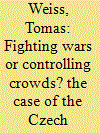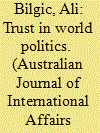|
|
|
Sort Order |
|
|
|
Items / Page
|
|
|
|
|
|
|
| Srl | Item |
| 1 |
ID:
121815


|
|
|
|
|
| Publication |
2013.
|
| Summary/Abstract |
The article explores the reform of the Czech military from the perspective of the possible blurring of police and military functions. The understanding of security has changed in recent years and the European militaries have taken up nontraditional tasks both within and outside Europe. Moreover, the fiscal conditions have provoked further reconsideration of the role of military. The Czech Republic's armed forces have undergone a number of reforms since 1989. The article focuses on three factors distinguishing the military from the police: territorial scope, use of force, and responsibility before the law. It concludes that although the Czech military has become more flexible, it does not use all its potential in practice, especially domestically. The article suggests that despite the adaptation to the new security environment, the military continues to be distinct from police.
|
|
|
|
|
|
|
|
|
|
|
|
|
|
|
|
| 2 |
ID:
140339


|
|
|
|
|
| Summary/Abstract |
This article engages with peace and security in Africa. Peace and security policy constitutes the main focus of cooperation between the European Union and the African Union under the 2007 Joint Africa–European Union Strategy and the current Roadmap 2014–2017. Peace and security is a major topic because, according to the Conflict Barometer 2014, Africa remains the most conflict-prone continent in the world. In the past two decades, various actors, including the United Nations, Africa's Regional Economic Communities, the European Union, ad hoc coalitions and individual states have launched a large number of peacekeeping operations in Africa. Despite some successes, there have also been significant failures and challenges. Consequently, there is an ongoing debate about peacekeeping in Africa and the participation of the European Union in supporting such operations. While the ‘African solutions to African problems’ agenda emerged in the early 2000s out of the perceived failures of the 1990s, the African Union has not, however, always lived up to the hopes. Subsequently, the United Nations has continued to play a major role in peacekeeping in Africa. In fact, the existing literature has neglected the important role of the United Nations with regard to European Union–African Union cooperation in general, including in the area of peace and security. A lot of the issues addressed in the Joint Africa–European Union Strategy, including its focus on peace and security, are related to the United Nation's agenda. Hence, this article will also demonstrate that, due to the major role played by the United Nations in European Union–African Union peacekeeping activities, making it without doubt an inseparable part of the European Union–African Union partnership, it is more appropriate to speak of an African Union–European Union–United Nations nexus. Last but not least, important lessons for regional, interregional and multilateral cooperation can be deduced from this innovative African Union–European Union–United Nations nexus. These include the need for the three actors to play to their strengths, making important and specific contributions, which, when combined, complement those of their partner institutions.
|
|
|
|
|
|
|
|
|
|
|
|
|
|
|
|
| 3 |
ID:
127351


|
|
|
|
|
| Publication |
2014.
|
| Summary/Abstract |
In the discipline of international relations, the concept of trust has been theorised in two ways: the 'rationalist' approach and the 'normative' approach. This article aims to show that these approaches do not adequately reflect how trust operates in world politics and that trust provides a new way of understanding the identity-security nexus in international relations. It is argued that as actors learn to trust each other, this trust-learning process has a transformative effect on their definition of self-interests and identities. The elaborated understanding of trust in the security dilemma is operationalised in terms of the immigration security dilemma.
|
|
|
|
|
|
|
|
|
|
|
|
|
|
|
|
|
|
|
|
|